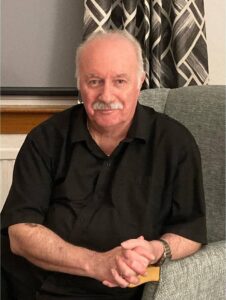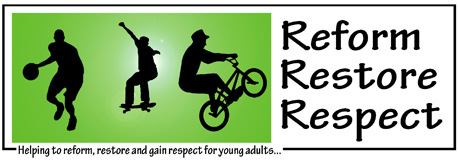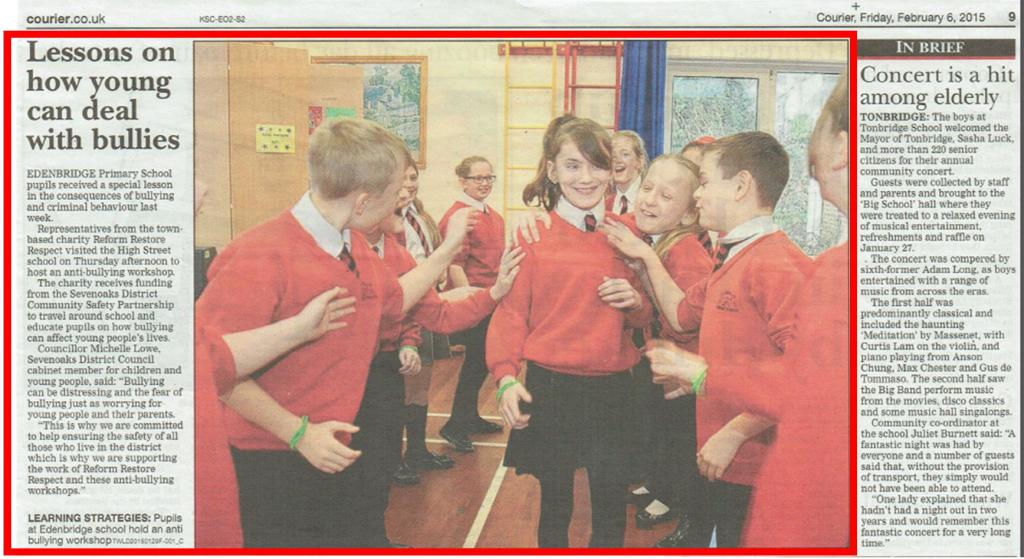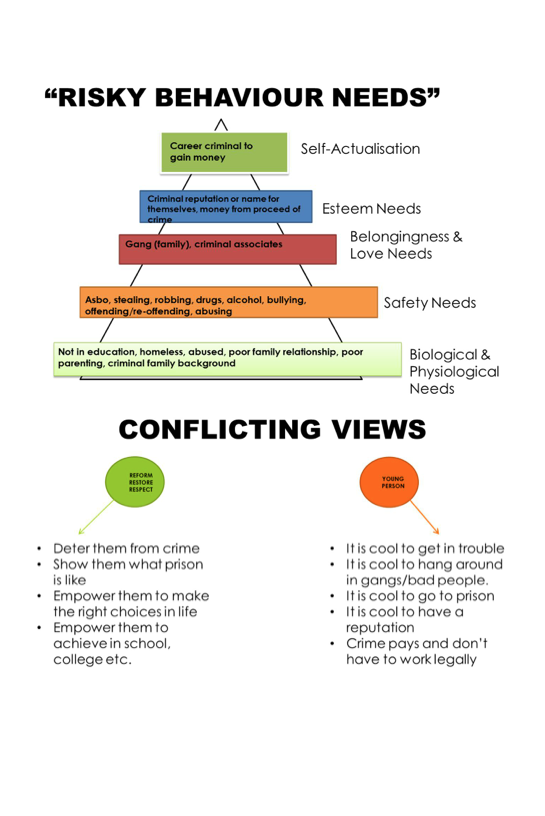Who we help
Reform Restore Respect was set up and founded by Francis Osei-Appiah FRSA to educate, encourage, inspire and transform the lives of young people who are vulnerable or at risk of offending or re-offending.
Our commitment is to be ‘part of the solution’ to safer communities and ‘joining hands’ with school teachers, social workers, youth offending teams, probation officers, police officers, youth workers, prison officers and other organisations in the third sector. Our services for schools is supported and endorsed by Sevenoaks District Council Community Safety Partnership and Kent Police.
How we help
The overall objectives of the charity are:
- To educate young people about the potential and power of their attitudes and actions. The charity aims to equip young people with tools that will enable them to make empowering choices hence deterring them from anti-social behaviour, peer pressure, gangs, low self-esteem and criminal activities.
- To encourage young people to set realistic and reachable goals, using some examples and testimonies of reformed low-risk ex-offenders and ex-gang members who have turned their lives around.
- To transform the lives of young people by assisting them in their pursuit to reach their full, intellectual, physical and spiritual potential.
- To contribute to reducing the number of entrants into the Youth/Criminal Justice System.
- The young people the project may target include:
-
-
- Those excluded from school for fixed terms or permanently
-
- Those who are already involved in the criminal justice system
- Gangs who are involved in terrorising local communities Specific community groups such as Somalia’s, Caucasians, gypsy travellers and other Black &Ethnic Minority groups
- Young people whom others may influence through peer pressure
- Young people who are dependent on drugs and alcohol
More than four out of ten males and one in ten females are likely to be found guilty or cautioned for an indictable offence at some point during their lives. However, it is also true that a comparatively small proportion of the population – about 5 per cent of males – are persistent offenders who account for about half of all known offending. Individuals more often break the law when they are young. Young people who become involved in crime before they are 14yrs tend to become the most persistent offenders, with longer criminal careers. The major risk factors for youth offending are:
- Individual Factors – includes hyperactivity and impulsive behaviour; early onset of aggressive and other problem behaviour; being male.
- Family – poor parental supervision; harsh or erratic discipline; family conflict; parental criminality; low family income.
- Peers – delinquent peer group; a high proportion of unsupervised time spent with peers.
- School Low attainment; low commitment/truancy; aggressive behaviour and bullying; exclusions; school disorganisation.
- Community Poverty – disadvantaged, neglected neighbourhood; community disorganisation, high turnover and lack of social ties; drug availability.
What is vulnerable Young Person at risk?
According to a recent report ‘A Joint Inspection by HMI Constabulary, HMI Probation, Care Quality Commission and Healthcare Inspectorate Wales, 2010’ Many adults in the criminal justice system began their offending careers in their childhood or early teens, after being subject to factors which made their offending more likely. When examining evidence-based practice, crime prevention work can be broadly grouped into four aspects, or domains: The family; School and work; Lifestyle, neighbourhood and community; and Self, personal and individual practices. All areas had a range of initiatives funded nationally and mainly targeted at areas of significant need.
There is no easy link of cause and effect between the factors associated with youth crime and actual offending. A range of risk factors are involved – which might include psychological, family, social, economic and cultural factors, plus of course the opportunity to commit an offence. These risks may be offset by positive influences such as good parenting. Crime does not happen in a social vacuum. It is correlated with social disadvantage and poverty. People living in deprived circumstances are at greater risk of being perpetrators—and victims—of crime. However, a simplistic, deterministic view of the causes of crime is not supported by the facts and risks both insulting those in deprived circumstances who do not commit offences and making excuses for those who do.
The number of young people found guilty by the juvenile courts or formally cautioned by police has fallen in England and Wales over the past 20 years. However, it is generally believed that this is not an accurate measure and that youth crime is far more prevalent than recorded crime suggests. Both police recorded crime statistics and national surveys of the victims of crime show that the types of the offence most often committed by young people – such as violence and taking vehicles – have risen dramatically over the same period.
Our Supporters
Reform Restore Respect is supported by a wide and diverse range of funders and donors without whom we could not have achieved our aims and objectives. On behalf of our trustees, staff and, much more importantly, the 31,818+ young people who have benefited from the services we have provided since 2012, we wish to thank the following organisations and individuals for their faith in, and support of, our work over the last 10 years.

Management Structure
A charity like Reform Restore Respect thrives on good governance and positive support. We are extremely grateful for all of our dedicated staff and trustees.
Our Trustees
Our Trustee Directors give their time freely to ensure that the charity continues to provide the best possible support to vulnerable young people.

Ziggy RAFFELT – Trustee Director :
Zbigniew ‘Ziggy’ Raffelt joined the board of trustees in December 2019 and he is our newest trustee, who works in a major Kent care facility for young people and who brings a wealth of knowledge of the many challenging issues facing our youth today.

Mr Steve FAULKNER – Trustee Director & Chair :
Currently works with Kings Hill Parish Council.
Steve has a strong knowledge of the local community and the voluntary sector.
He is the pioneer behind Yalding and Laddingford Sports Association which is a combination of a cricket and football club for young people in the community.
Steve’s drive and motivation have seen the football club grow tremendously from just 1 men’s team in 2010 to now under 8s, under 10s, under 12s and under 15s football teams.
Steve decided to join Reform Restore Respect’s Board of Trustees as he has empathy for the welfare of young people, and he has a clear drive to ensure that young people make the right decisions in life through positive engagement in sports at an early age.

Mr Ian ROSS FRSA – Trustee Director & Treasurer :
Former Founder, Company Secretary and CEO of Outside Chance, a sister charity operating in a similar field to Reform Restore Respect.
Considerable experience of working with challenging young people.
24 years of experience in the voluntary sector.
21 years’ experience of operating Outside chance.
18 years’ experience of workshop delivery in HM YOI Feltham.
Strong working knowledge of fundraising and financial management.
Ian felt that he could bring his considerable experience in both the voluntary sector and working with young people to the board. His ethos closely follows that of the aims and objectives of Reform Restore Respect.
Our Trustees ensure that:
-
-
- All beneficiaries are paramount
- All legal requirements are met
- Charity funds are used well
- Systems are in place to protect charity funds
- Fundraising and publicity initiatives are well supported
-
Trustees commit to a minimum of 4 meetings a year, plus any personal involvement in attending our workshops and inspecting charity systems. The greater the range of skills and experience the members of our board have, the better. We always welcome new Trustees to join, and the Chair of the Board or the Chief Executive would be happy to discuss your possible involvement before you make any commitment. You are also welcomed to sit in on a Board Meeting and meet the other people involved before making your decision.
Our Staff
Rewarding, making a difference, reducing crime, community safety, the ‘good guys’ – whatever the role, working for Reform Restore Respect is all of these.

Mr. Francis OSEI APPIAH BA (Hons), FRSA, Dip HSC, CertManCare, CertHSC, PTTLS –Founder, Company Secretary and CEO of Reform Restore Respect
Attended and completed a PTLLS – Preparing to Teach in the Lifelong Learning Sector – Teacher Training Course
Level 3 Certificate in Working with Vulnerable Young People
Honours Degree in Health and Social Care
Diploma in Health and Social Care
Certificate in Managing Care
Certificate in Health and Social Care
NVQ Level 3 in Health and Social Care
GNVQ in Business Studies
Former Trustee Director of Weald of Kent Vocational Fund Trust
Reform Restore Respect employs 1 staff (plus volunteers) and their dedication is key to our success. To ensure we have the best possible people in our teams, we have developed comprehensive policies and training. This provides every member of staff with all the skills and knowledge they need. As a charity using the Disclosure and Barring Service (DBS) Enhanced Disclosure service, all of our staff and board of trustees are vetted to assess their suitability for positions of trust. Reform Restore Respect complies fully with the DBS Code of Practice and undertakes to treat all applicants for positions fairly. If you are interested in a full-time or part-time volunteering role at Reform Restore Respect, we would love to hear from you. For more information about working at Reform Restore Respect, please contact either Francis Osei Appiah on 07904764291 or email info@reformrestorerespect.org






